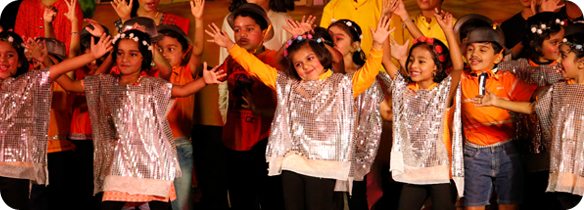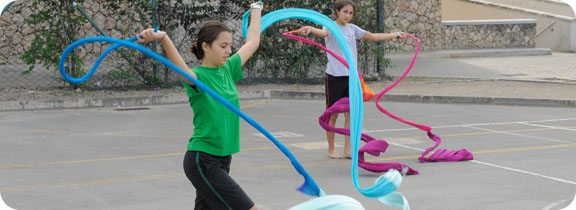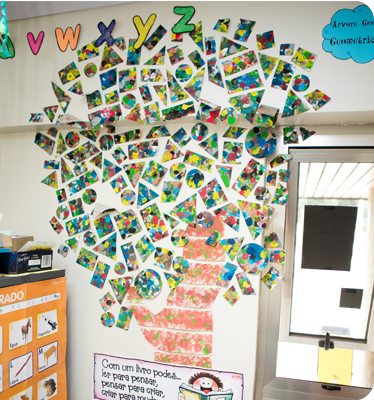
Primary Years Programme
The Aga Khan Academy Dhaka is an International Baccalaureate World School and has been authorised for the Primary Years Programme (PYP).
Foundations for lifelong learning
Our PYP curriculum for students in Grades 1-5 (aged 6-11) focuses on the development of the whole child. It is geared towards creating independent, confident and respectful learners.
Our classroom curriculum addresses the children's social, physical, cultural and ethical development while giving them a strong foundation in all the major areas of knowledge.
The curriculum consists of five essential elements:
- Concepts;
- Knowledge;
- Skills;
- Attitude; and
- Action.
 The core subjects we cover include English language, Bangla, mathematics, social studies, science and technology. Our programme also includes physical education, music and art. The use of Informational technology (IT) is integrated throughout the curriculum.
The core subjects we cover include English language, Bangla, mathematics, social studies, science and technology. Our programme also includes physical education, music and art. The use of Informational technology (IT) is integrated throughout the curriculum.
Students and teachers explore questions in all subject areas using an interactive, student-centred approach. This triggers students' curiosity, encouraging them to make connections with real-world issues. Students become active, autonomous learners who can take action as a result of their learning.
Our curriculum develops well-rounded students who are well-versed in all areas of knowledge. They learn to be intellectually curious, principled, caring, open-minded, well-balanced and reflective learners.
Please visit the Admission Requirements page to find out more about applying to Grades 1-5 at the Academy.

Aga Khan Curricular Strands
The Aga Khan Curricular Strands (AK Strands) are a unique part of the programme offered by the Aga Khan Academies. The AK Strands are areas of learning aimed specifically at developing knowledge, skills and attitudes required by future leaders.
Our goal at the Academies is to develop young people who have strong local roots and are also globally minded. They should be able to become leaders in whichever fields they choose.
To help achieve this goal, we have identified five areas of learning, the Aga Khan Curricular Strands, that we believe are important for our students. These are:
- Ethics
- Pluralism
- Cultures (with an emphasis on Muslim civilisations)
- Governance and Civil Society
- Economics for Development
Implementing the AK Strands
The Aga Khan Curricular Strands are not taught as independent subjects. Instead, we weave them into the existing subject areas of the academic curriculum. They help inform the selection of content and themes for study. The AK Strands also provide direction for school life outside the classroom in areas such as policy making, recruitment, student life and residential life.
Two of the AK Strands, Ethics and Pluralism, help students develop values and dispositions required by ethical leaders. Our students learn about these areas in theory and are also encouraged to practice what they learn in their everyday lives.
Through the other three AK Strands, our students learn about ideas that are important to the functioning of societies. In particular, they learn about how these ideas impact people’s lives in countries of the developing world. The knowledge they gain helps them understand key issues from both local and international perspectives.
The AK Strands in practice
The Aga Khan Curricular Strands have been developed and tested over several years at the Aga Khan Academy Mombasa. This has led to new ideas and creative methods of teaching.
For example, teachers in different departments are using the AK Strands to collaborate in interesting ways. In one project, year 7 students worked on a unit that related to Governance and Civil Society in both humanities and English. They linked their theoretical understanding of authority structures to their study of the novel, The Giver.
They looked at questions of governance, freedom of choice, security and related ethical questions through the lenses of both subject areas. This allowed for a unique learning experience that was both broad and deep.
Through the Aga Khan Curricular Strands, our students develop attitudes and values that will help them throughout their lives. They also gain knowledge and understanding that will allow them to contribute positively to their societies in the future.
For more information on the educational programme offered at the Aga Khan Academy Mombasa please visit the Academic Programme page.

Aga Khan Curricular Strands
The Aga Khan Curricular Strands (AK Strands) are a unique part of the programme offered by the Aga Khan Academies. The AK Strands are areas of learning aimed specifically at developing knowledge, skills and attitudes required by future leaders.
Our goal at the Academies is to develop young people who have strong local roots and are also globally minded. They should be able to become leaders in whichever fields they choose.
To help achieve this goal, we have identified five areas of learning, the Aga Khan Curricular Strands, that we believe are important for our students. These are:
- Ethics
- Pluralism
- Cultures (with an emphasis on Muslim civilisations)
- Governance and Civil Society
- Economics for Development.
Implementing the AK Strands
The Aga Khan Curricular Strands are not taught as independent subjects. Instead, we weave them into the existing subject areas of the academic curriculum. They help inform the selection of content and themes for study. The AK Strands also provide direction for school life outside the classroom in areas such as policy making, recruitment, student life and residential life.
Two of the AK Strands, Ethics and Pluralism, help students develop values and dispositions required by ethical leaders. Our students learn about these areas in theory and are also encouraged to practice what they learn in their everyday lives.
Through the other three AK Strands, our students learn about ideas that are important to the functioning of societies. In particular, they learn about how these ideas impact people’s lives in countries of the developing world. The knowledge they gain helps them understand key issues from both local and international perspectives.
The AK Strands in practice
The Aga Khan Curricular Strands were developed at the first Aga Khan Academy in Mombasa and are designed to be used in different cultural contexts. Teachers from the Aga Khan Academy Maputo help tailor the AK Strands for the local environment in Mozambique.
Through the Aga Khan Curricular Strands, our students develop attitudes and values that will help them throughout their lives. They also gain knowledge and understanding that will allow them to contribute positively to their societies in the future.
For more information on the educational programme offered at the Aga Khan Academy Maputo, please visit the Academic Programme page.
Welcome to your new Acquia Drupal website!
If you are new to Drupal, follow these steps to set up your web site in minutes:
Step 1. Start at the beginning
Visit the administration section for a task-based or module-based overview of the options available to configure your website.
Step 2. Connect to the Acquia Network
At any time you can activate an Acquia Network subscription to gain access to Acquia's timely, professional support, automated services such as Mollom spam blocking, Acquia Library and documentation. Acquia offers subscription levels for every size web site - from individual blogs to enterprise-scale, multi-site deployments. Once you have your Acquia Network subscription keys, enter them on the settings page. Get started with a free trial today.
Step 3. Activate functionality
Turn on added functionality for your site - blogs, forums, polls, tags, comments, and more. Acquia Drupal comes with important modules to power social publishing capabilities on your site.
Hundreds of additional Drupal 7.x compatible modules are available on Drupal.org in the Drupal modules download section, which you can install through your modules page.
Step 4. Start publishing content
Start creating content for your site. Depending on which modules you have activated, you may see blogs, forums, polls and more as available content types.
Some optional configuration tasks are shown below. For more information, please refer to the built-in help section, or the online Drupal handbooks.
Choose a different design
Start by changing the colors of the default theme. To change the fundamental "look and feel" of your website, visit the appearance section and choose a theme from one of the many themes available out-of-the-box.
Many additional Drupal 7.x compatible themes are available on Drupal.org in the Drupal themes download section, which you can install through your themes page.
Configure the front page
The default front page is a listing of all content marked as Promoted to front page
. You can manage your content from the content administration page. You can also designate, for example, an item of content you have created as the front page. See the site information settings page to configure the default front page path. You can also edit you site name and add a slogan to make the site your own.
Naail Lakhani: Learner Agency Through Coding
Naail Lakhani, a Year 5 student in Junior School, has demonstrated incredible maturity, leadership, and initiative since joining the Aga Khan Academy Mombasa in 2018. His proudest achievement is founding the Junior School Coding Club, an after-school extracurricular activity to teach coding to young minds. With approximately 30 members, Naail has been running the club successfully for over a year now.
Naail developed his passion for coding at the beginning of COVID-19 pandemic. “One day, I decided to search up easy coding for kids, and I stumbled upon this great website called Khan Academy which taught me different programming languages like C++ and Javascript,” said Naail. “I was then approached by Ms. Nuala Alibhai, the Head of Student Support and well-being in Junior School, who knew about my interest in coding and proposed the idea of starting a club in school. I agreed, and the coding club was born.”In addition to teaching coding skills, the club encourages its members to develop learner agency - shifting ownership of learning from teachers to students. "I believe that learner agency is important because it allows students to build their critical thinking and problem-solving skills, as well as perseverance and adaptability," Naail said. Members of the club attain learner agency by practicing coding rather than just learning it so that they can have the opportunity to apply their knowledge and test their understanding.
“I have been a part of the coding club since it first began, so for over a year now, and I have loved every minute of it,” says Kanika Tahiliani, a student in Year 4. “I learnt how to make shapes and add color to different objects like foods and a snowman using code.”
As Naail transitions to Senior School, he plans to continue and expand his club. By increasing the club’s capacity and opening up the club to both Junior and Senior School, Naail hopes to inspire more students to pursue coding. “My coding club is just the beginning,” said Naail. “I can already see myself working in tech companies like Google when I am older, or maybe I can even start my own company.”
Junior School Student-Led Conferences..
The Academy Junior School is holding their end-of-year Student-Led Conferences (JS SLC) for current parents in the Junior School classrooms on Friday 27 May 2016, from 8.30am to 3.30pm. Refreshments will be available.
The Academy Junior School Annual Art Exhibition
The Academy Junior School Annual Art Exhibition – Celebration of Creativity - Friday 27th May 2016 from 8:30 am to 4:00 pm in The Junior School Library. Refreshments available. All parents, prospective and current, are welcome to attend.
Marking India's Independence Day
India's 70th Independence Day will be celebrated by The Academy's residential staff and student community on 15th August with a flag hoisting ceremony at 8:30am followed by a street theatre performance by students and a special Hyderabadi breakfast.
2016-17 Academy Junior School Orientation
New parents are invited to attend an orientation & information session from 1:15pm on Saturday, 20th August 2016. An introductory session will be followed by classroom visits and teacher interactions. We hope to see you!
Upcoming interschool sports competitions
The Academy students are participating in interschool U-19 basketball and age 12-18 swimming competitions from 24th – 26th August, 2016 at Oakridge International School. We wish them luck!



